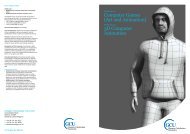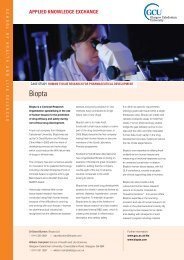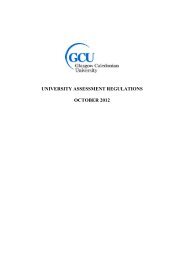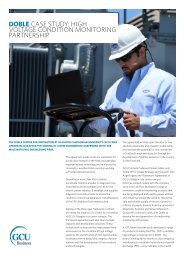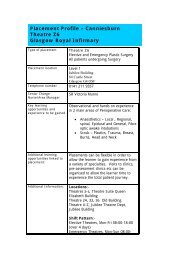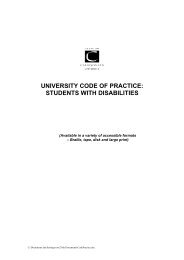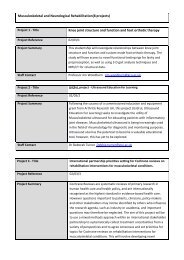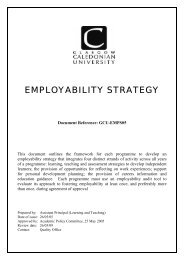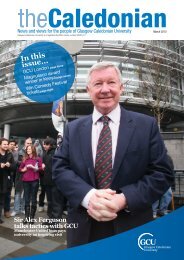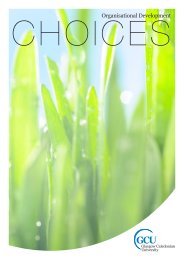Postgraduate - Glasgow Caledonian University
Postgraduate - Glasgow Caledonian University
Postgraduate - Glasgow Caledonian University
Create successful ePaper yourself
Turn your PDF publications into a flip-book with our unique Google optimized e-Paper software.
School of Law and Social Sciences 93<br />
Contact: School Research Co-ordinator<br />
E: Michelle.Connolly@gcal.ac.uk<br />
T: +44(0)141 331 3276<br />
W: www.caledonian.ac.uk/lss<br />
Social Justice and Inequality, and Health are the<br />
two main fields of research within the School of<br />
Law and Social Sciences. We welcome enquiries<br />
regarding research undertaken in the following<br />
areas: Poverty, Welfare and Health; Violence,<br />
Violation and Public Health; History of Health and<br />
Welfare; History of War and Society; History of<br />
Modern Scotland; Equalities, Diversity and Work;<br />
Regulation, Policing and Security; European<br />
Politics and Multi-level Governance; and Political<br />
Theory and Ideology. Sub-themes are embedded<br />
in established Research Centres and groups, some<br />
of which involve established collaborations<br />
and/or articulate with other universities, in some<br />
instances through Scottish level sector wide<br />
research pooling institutes.<br />
The school hosts the Scottish Poverty Information<br />
Unit, the <strong>Caledonian</strong> Centre for Equality and Diversity,<br />
the Organisations, Work and Care group, and the Centre<br />
for the Social History of Health and Healthcare. The<br />
school is also partnered with various Scottish wide<br />
research centres, including: the Centre for Research on<br />
Families and Relationships (CRFR), The Scottish Institute<br />
for Policing Research (SIPR), The Scottish Centre for Crime<br />
and Justice Research (SCCJR), and The Joseph Bell Centre<br />
for Forensic Statistics and Legal Reasoning. Each of the<br />
discipline based groupings that constitute the School of<br />
Law and Social Sciences has a strong and coherent<br />
research culture.<br />
Law<br />
The Division of Law has an extensive research profile and<br />
is looking to build on existing research initiatives such as:<br />
Women in the Law; Law and IT; and Islamic Law. More<br />
generally, there is expertise in Delict, Employment,<br />
Constitutional Law, Public Law, European Union Law and<br />
International Law, Media Law, Company Law, and<br />
Human Rights and the use of State Force. The work of<br />
the Division is interdisciplinary in nature and staff are<br />
exploring research collaborations in Healthcare Law and<br />
Ethics, on a multidisciplinary history of Childhood<br />
Protection in Scotland, and by adding an international<br />
legal dimension to the work of colleagues within the<br />
School on Equality and Diversity. It is also a partner in<br />
The Joseph Bell Centre for Forensic Statistics & Legal<br />
Reasoning, based at the <strong>University</strong> of Edinburgh.<br />
Criminology<br />
The newly formed multidisciplinary Criminology group<br />
involves members from across the <strong>University</strong>, with<br />
backgrounds in Criminology, Psychology, Sociology,<br />
History, Law and Public Policy. The research of this group<br />
in criminal and social justice is structured around two<br />
organising themes of Violence, Violation and Public<br />
Health, and Regulation, Policing and Security. Within<br />
these themes, staff are working on gender and violence,<br />
domestic violence, gangs and violence, risk assessment<br />
and public health, violation and organisations, policing<br />
of ethnic minorities and young people, and trafficking in<br />
people and missing persons, to name but a few.<br />
Group members have strong links with the <strong>Glasgow</strong><br />
Centre for the Study of Violence (based at GCU), The<br />
Scottish Centre for Crime and Justice Research (SCCJR),<br />
The Scottish Institute for Policing Research (SIPR), the<br />
Centre for Research on Families and Relationships (CRFR),<br />
the Risk Management Authority and other national and<br />
international government and non government agencies<br />
and other voluntary and statutory agencies.<br />
Sociology<br />
The Sociology group is well established and focuses<br />
around three major areas of research: Poverty, Welfare<br />
and Health; Violation, Violation and Public Health (driven<br />
principally by the Criminology group); and Equalities,<br />
Diversities and Work. The work of the group has<br />
contributed to national and international debates on a<br />
range of areas including poverty and social inclusion,<br />
sociology of health, ageing and society, well-being, work<br />
life balance, gender and equality issues, and violence.<br />
Applied research includes work with voluntary sector<br />
organisations, charities, government departments and<br />
other agencies to enhance the links between research,<br />
analytical thinking and ideas, and policy and practice<br />
developments.<br />
Sociology hosts the Scottish Poverty Information<br />
Unit (SPIU), the Organisations, Work and Care group and<br />
is also a collaborating partner in the Centre for Research<br />
on Families & Relationships (CRFR).<br />
Politics<br />
The current areas of research focus within the unit have<br />
built upon an existing track record in European and<br />
territorial politics and may be categorised under one or<br />
both of two main overarching themes, mainly: European<br />
Politics and Multi-level Governance, and Political Theory<br />
and Ideology. These areas encompass the politics of<br />
immigration and asylum, politics of education policy,<br />
politics of health, environmental political theory, state<br />
theory, and democratic theory, amongst others.<br />
The international dimension to most of the unit’s work<br />
fits seamlessly into the broader research themes of<br />
societal studies, social policy and social inclusion. Such<br />
themes easily encompass the study of political and<br />
institutional frameworks which ultimately determine the<br />
socio-political context within which states and societies<br />
seek to tackle the challenges facing our social and<br />
natural environments.<br />
Collaborative research links exist with the Stein<br />
Rokkan Centre, <strong>University</strong> of Bergen and through<br />
involvement in the Centre for Research on Families &<br />
Relationships (CRFR).<br />
History<br />
The History group at <strong>Caledonian</strong> operates under the<br />
banner of History@<strong>Caledonian</strong>, with the activity taking<br />
place within a structured research environment focused<br />
on three main interlocking themes: History of health and<br />
welfare; war and society in Germany and Austria; and<br />
Modern Scottish history. More specifically, the group are<br />
conducting research in the post-war European welfare<br />
states, the history of child guidance and child psychiatry,<br />
social welfare in modern Britain, the history of<br />
occupational health, the history of war and society,<br />
migration and community identity, socio-political<br />
development in modern Scotland, and modern Highland<br />
and Scottish history.<br />
<strong>Glasgow</strong> <strong>Caledonian</strong> <strong>University</strong> is also the lead<br />
institution in the Centre for the Social History of Health<br />
and Healthcare (CSHHH) in partnership with colleagues<br />
at the <strong>University</strong> of Strathclyde. The history group places<br />
a high priority on national and international research.<br />
Important links have been established with research<br />
partners at Stony Brook <strong>University</strong>, New York, the<br />
<strong>University</strong> of Auckland, and with the German Historical<br />
Institute in London.



